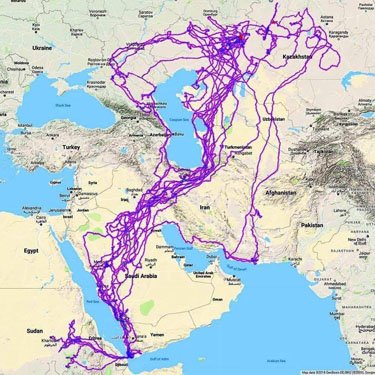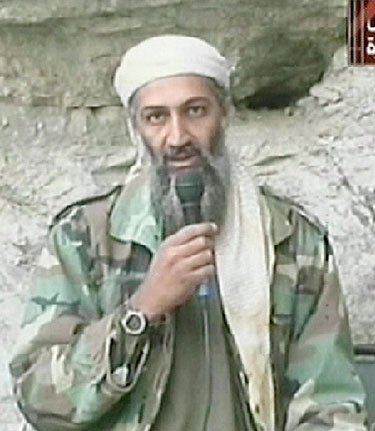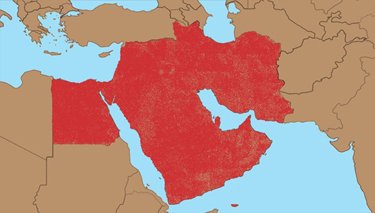Category Archive 'Middle East'
10 Nov 2023
——————————-
General McPhillips is the USMC Central Command, i.e. the Middle East, head honcho, so it’s pretty easy to understand what those “unforeseen operational commitments” pertain to.
03 Mar 2019

Scientists tracked the movements of an eagle over a period of 20 years.
20 Apr 2015


David Samuels, in an important essay, argues that Osama bin Laden out-strategized a series of dimbulb American administrations, astutely predicting precisely how they would respond.
judging from his last known private letter, dated April 25, 2011, Bin Laden died a happy man. “What we are witnessing these days of consecutive revolutions is a great and glorious event,†he mused, after watching the fall of the secular, Western-backed regimes in Tunisia and Egypt, which he watched on CNN, before the daring Navy SEAL raid on his compound in Abbottabad, Pakistan. “[T]hanks to Allah things are strongly heading toward the exit of Muslims from being under the control of America.â€
Even at this late date, it seems difficult for American policymakers to grasp exactly how Bin Laden’s mastery of the inherently paradoxical logic of warfare—a logic very different than the linear cause-and-effect style of reasoning that governs normal life and electoral politics alike—allowed a man without a country, heavy weapons, or even broadband Internet access to reshape the world to his advantage. The clarity of Bin Laden’s strategic insight, which now seems obvious, also suggests that the dynamic that he deliberately set in motion is still unfolding, in ways that he foresaw before his death—ways that continue to roil the Middle East and will continue to pose a threat to the safety of Americans at home. …
Bin Laden was never shy about explaining what he was doing and why. His public statements about his strategic logic and goals in targeting “the far enemy†remained remarkably consistent, from his first fatwa against America until the last letter he wrote before his death. In his 1996 “Declaration of War Against the Americans Occupying the Land of the Two Holy Places,†published soon after the Khobar Towers bombings in Saudi Arabia, he explained that “it is essential to hit the main enemy who divided the Ummahâ€â€”the Muslim world—“into small and little countries and pushed it, for the last few decades, into a state of confusion.â€
America’s response to an attack would be to get sucked into a war, he predicted—and when the going got tough, the United States would cut and run. Responding to then-U.S. Defense Sec. William Perry, who had called the Khobar bombers cowards and had sworn not to give in, Bin Laden asked, “Where was this false courage of yours when the explosion in Beirut took place on 1983 AD (1403 A.H). You were turned into scattered pits and pieces at that time; 241 Marine soldiers were killed.†…
In public and private following the Sept. 11 attacks, he returned to the same themes, over and over again, in at least three-quarters of his public statements and in private letters to other jihadists that were seized from his compound in Abbotabad and later made public. “The goal is to weaken America until it can no longer interfere in Muslims affairs,†he explained, in a letter whose contents were entirely typical of his communications. “Once the American enemy has been defeated, our next step would be targeting the region’s leaders who had been the pillars of support for that American hegemony.â€
It is proof of Bin Laden’s mastery of the unexpected logic that animates strategic thought, and of the glaring inability of America’s political leaders to think strategically, that not one but two American presidents have faithfully acted their roles in his geo-political script: George W. Bush, the hawk, with his open-ended and heavy-handed occupation of Iraq; and Barack Obama, the dove, with his precipitous and wholesale withdrawal of American military forces and influence from the Middle East. Both men—and their many advisers—should have known better.
Read the whole thing. It’s depressing reading and hard to argue with.
Hat tip to Claire Berlinski.
28 Jul 2014


Walter Russell Mead admires the way the Mainstream Media looks carefully away as the Obama Administration’s “Smart Diplomacy” puts Middle Eastern countries, provinces, and WMDs into the hands of murderous fanatics. The days of the New York Times micromanaging US Foreign Policy are clearly over.
If Obama were a Republican, the press and the weekly news shows would be ringing with hyperbolic, apocalyptic denunciations of the clueless incumbent who had failed to learn the most basic lessons of Iraq. Indeed, the MSM right now would be howling that Obama was stupider than Bush. Bush, our Journolist friends would now be saying ad nauseam, at least had the excuse that he didn’t know what happens when you overthrow a paranoid, genocidal, economically incompetent Arab tyrant in an artificial post-colonial state. But Obama did—or, the press would nastily say, he would have done if he’d been doing his job instead of hitting the golf course or yakking it up with his glitzy pals at late night bull sessions. The ad hominem attacks would never stop, and all the tangled threads of incompetence and failure would be endlessly and expertly picked at in long New Yorker articles, NYT thumbsuckers, and chin-strokings on all the Sabbath gasbag shows.
Why, the ever-admirable tribunes of a free and unbiased press would be asking non-stop, didn’t this poor excuse for a President learn from what happened in Iraq? When you upend an insane and murderous dictator who has crushed his people for decades under an incompetent and quirky regime, you’d better realize that there is no effective state or civil society under the hard shell of dictatorial rule. Remove the dictator and you get chaos and anarchy. Wasn’t this President paying attention during the last ten years?
Some of the criticism would be exaggerated and unfair; the Monday morning quarterbacks never really understand just how complicated and tragic this poor world really is, not to mention how hard it is to make life and death decisions in real time in the center of the non-stop political firestorm that is Washington today. And the MSM attracts more than its share of deeply inexperienced but entitled, self-regarding blowhards who love to pontificate about how stupid all those poor fools who have actual jobs and responsibilities actually are.
But luckily for Team Obama, the mainstream press would rather die than subject liberal Democrats to the critiques it reserves for the GOP. So instead, as Libya writhes in agony, reputations and careers move on. The news is so bad, and the President’s foreign policy is collapsing on so many fronts, that it is impossible to keep the story off the front pages. “Smart diplomacy†has become a punch line, and the dream Team Obama had of making Democrats the go-to national security party is as dead as the passenger pigeon. But what the press can do for the White House it still, with some honorable exceptions, labors to accomplish: it will, when it must, report the dots. But it will try not to connect them, and it will do what it can to let all the people involved in the Libya debacle move on to the next and higher stage of their careers.
Read the whole thing.
21 Jul 2014


The Onion has figured out the answer of how to achieve an enduring Middle East peace.
NEW YORK—Marking the latest and most ambitious attempt to bring stability to the region, the United Nations announced Wednesday that every single person in the Middle East will receive his or her own sovereign nation as part of a historic 317,000,000-state solution.
The broad and extensive compromise, which affects more than 3,000,000 square miles formerly occupied by the territories of Israel, the West Bank, Gaza, Syria, Iraq, Iran, Saudi Arabia, Lebanon, Oman, Yemen, Egypt, and Jordan, will reportedly draw over 750,000,000 new borders in what experts claim will help drastically curb sectarian violence.
“Given the incredibly complex and volatile sociopolitical landscape throughout the Middle East, a 317,000,000-state solution is the only realistic means of achieving lasting peace,†said U.N. Security Council president Eugène-Richard Gasana, noting that the treaty was reached after lengthy negotiations, which brought together each of the more than 300,000,000 independent factions. …
“We are confident that with every man, woman, and child possessing his or her own autonomous area of sovereignty to run as he or she sees fit, we will avoid many of the conflicts that have plagued this part of the world for centuries and left countless dead,†Gasana added. “This is a bright new future for the Middle East.â€
According to U.N. officials, the newly demarcated Middle East now consists of 8,000,000 independent Jewish states, 4,000,000 independent Palestinian states, 112,000,000 Shi’ite Islamic republics, 156,000,000 Sunni Islamic republics, and 19,000,000 Kurdish nations, as well as approximately 18,000,000 territories that include various Christian, Bahá’Ã, Druze, Zoroastrian, and secular countries.
Read the whole thing.
05 Jul 2014


People’s Cube: “That awkward moment when you realize that your badass jihadi boss owns a “Hello Kitty” notebook for his military battle plans…”
24 Aug 2013


Detail from Fra Angelico, St. Nicholas Giving Gold to the Three Poor Girls, 1437, Città del Vaticano, Pinacoteca.
SlumberWise explains that people used to sleep differently in Olden Times.
[W]e didn’t always sleep in one eight hour chunk. We used to sleep in two shorter periods, over a longer range of night. This range was about 12 hours long, and began with a sleep of three to four hours, wakefulness of two to three hours, then sleep again until morning.
References are scattered throughout literature, court documents, personal papers, and the ephemera of the past. What is surprising is not that people slept in two sessions, but that the concept was so incredibly common. Two-piece sleeping was the standard, accepted way to sleep.
“It’s not just the number of references – it is the way they refer to it, as if it was common knowledge,†Ekirch says.
An English doctor wrote, for example, that the ideal time for study and contemplation was between “first sleep†and “second sleep.†Chaucer tells of a character in the Canterbury Tales that goes to bed following her “firste sleep.†And, explaining the reason why working class conceived more children, a doctor from the 1500s reported that they typically had sex after their first sleep.
Ekirch’s book At Day’s Close: Night in Times Past is replete with such examples.
But just what did people do with these extra twilight hours? Pretty much what you might expect.
Most stayed in their beds and bedrooms, sometimes reading, and often they would use the time to pray. Religious manuals included special prayers to be said in the mid-sleep hours.
Hat tip to Ann Rice [via FB].
16 Jan 2013

(click on image for larger version)
A fascinating illustration of the astonishing diversity of languages found at the geographic meeting points of the Indo-European, Semitic, and Turkic language families. It is also very interesting to note how large a portion of the land area of the Middle East is arid and uninhabited.
29 May 2012


The Russian cybersecurity company Kaspersky has discovered that a truly massive piece of malware has been lurking on computers in Iran and other Islamic locations for at least two years. The software discovered is believed to be state-sponsored, and everyone is refraining in print from finger-pointing at the United States.
Wired:
A massive, highly sophisticated piece of malware has been newly found infecting systems in Iran and elsewhere and is believed to be part of a well-coordinated, ongoing, state-run cyberespionage operation.
The malware, discovered by Russia-based anti-virus firm Kaspersky Lab, is an espionage toolkit that has been infecting targeted systems in Iran, Lebanon, Syria, Sudan, the Israeli Occupied Territories and other countries in the Middle East and North Africa for at least two years.
Dubbed “Flame†by Kaspersky, the malicious code dwarfs Stuxnet in size – the groundbreaking infrastructure-sabotaging malware that is believed to have wreaked havoc on Iran’s nuclear program in 2009 and 2010. Although Flame has both a different purpose and composition than Stuxnet, and appears to have been written by different programmers, its complexity, the geographic scope of its infections and its behavior indicate strongly that a nation-state is behind Flame, rather than common cyber-criminals — marking it as yet another tool in the growing arsenal of cyberweaponry.
The researchers say that Flame may be part of a parallel project created by contractors who were hired by the same nation-state team that was behind Stuxnet and its sister malware, DuQu.
“Stuxnet and Duqu belonged to a single chain of attacks, which raised cyberwar-related concerns worldwide,†said Eugene Kaspersky, CEO and co-founder of Kaspersky Lab, in a statement. “The Flame malware looks to be another phase in this war, and it’s important to understand that such cyber weapons can easily be used against any country.â€
Early analysis of Flame by the Lab indicates that it’s designed primarily to spy on the users of infected computers and steal data from them, including documents, recorded conversations and keystrokes. It also opens a backdoor to infected systems to allow the attackers to tweak the toolkit and add new functionality.
The malware, which is 20 megabytes when all of its modules are installed, contains multiple libraries, SQLite3 databases, various levels of encryption — some strong, some weak — and 20 plug-ins that can be swapped in and out to provide various functionality for the attackers. It even contains some code that is written in the LUA programming language — an uncommon choice for malware.
Kaspersky Lab is calling it “one of the most complex threats ever discovered.â€
“It’s pretty fantastic and incredible in complexity,†said Alexander Gostev, chief security expert at Kaspersky Lab.
Flame appears to have been operating in the wild as early as March 2010, though it remained undetected by antivirus companies.
“It’s a very big chunk of code. Because of that, it’s quite interesting that it stayed undetected for at least two years,†Gostev said. He noted that there are clues that the malware may actually date back to as early as 2007, around the same time-period when Stuxnet and DuQu are believed to have been created.
Read the whole thing.
02 Nov 2011

On the same subject, Fjordman marvels at Western political leaders actively supporting Islamic revolutionaries in the Middle East. It was Qaddafi versus Al Qaeda after all, and we supported al Qaeda.
Many ordinary citizens, when witnessing our so-called leaders supporting our enemies, wonder whether Western political elites have lost their grip on reality. What are they trying to achieve with such stupid and suicidal policies? Why do they want to export democracy to Islamic countries, even if this brings radical organizations with hostile agendas to power, at the same time as the democratic system is being de facto abolished in Europe by the European Union?
My personal view is that the cultural, economic and especially immigration policies currently promoted by the ruling elites throughout virtually the entire Western world are harmful to the long-term interests of the European peoples who created this civilization. One fundamental question that has been hotly debated on the Internet by dissident writers is whether this trend is entirely accidental, and exclusively reflects the purely impersonal forces of technological globalization, or whether there is also a purpose and a plan behind some of these changes. …
Today the ruling ideology is an absolute egalitarianism that if you analyze it closely actually amounts to saying that all cultures have an equal right to exist, except the European one which is evil.
Read the whole thing.
16 Sep 2011


Strategy Page is probably too optimistic in thinking that there is any real possibility of Arabs ever choosing democracy and secular modernity over Islamic dictatorship.
In the last decade, the world has learned what Israelis have known for a long time; Arabs and their governments tend to favor self-destructive policies. Western nations have generally ignored this madness, or excused each instance as a momentary lapse in good judgment. But this bad behavior has spawned Islamic terrorism, and sustains it. Many Arabs believe what al Qaeda preaches, that the world should be ruled by an Islamic religious dictatorship, and that this must be achieved by any means necessary (including force, against non-Moslems, and Moslems who don’t agree.) This sort of thinking has been popular with Islamic conservatives since Islam first appeared in the sixth century. Since then, it has periodically flared up into major outbreaks of religious inspired violence. But that’s not the only problem. Arabs, in particular, sustain these outbursts with their fondness for paranoid fantasies and an exaggerated sense of persecution and entitlement.
Read the whole thing.
Your are browsing
the Archives of Never Yet Melted in the 'Middle East' Category.
/div>

Feeds
|













